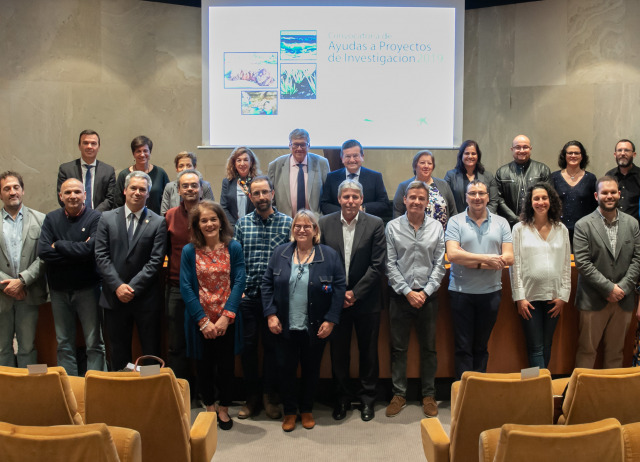7th Call for Grants for Research Projects 2019: Fundación Caja Canarias y Obra Social La Caixa
The Institute of Natural Products and Agrobiology has two projects among those selected by the Fundación Caja Canarias and Obra Social La Caixa in their 7th Call for Grants for Research Projects 2019: The primary sector in the Canary Islands.
On Monday 17 February, the financing agreements were signed in the CajaCanarias Cultural Space, an event attended by the IPNA researchers responsible for the projects, Jana Alonso Lorenzo and José Manuel Pérez de la Lastra, accompanied by the director of the Institute of Natural Products, Manuel Nogales Hidalgo. The event was also attended by the territorial director of CaixaBank in the Canary Islands, Juan Ramón Fuertes, and the president of the Fundación CajaCanarias, Alberto Delgado.
The project "Entre pimientas anda el mojo: tipificación genética y caracterización bioquímica de las variedades antiguas palmeras" is led by the researcher Jana Alonso and involves interdisciplinary collaboration with entities such as the Instituto de Hortofruticultura Subtropical y Mediterránea La Mayora (IHMS CSIC), the Centro de Agrodiversidad de La Palma, and the Cabildo Insular de La Palma. The research team is made up of highly experienced researchers and the project will be carried out almost entirely at the Juan José Bravo Rodríguez Laboratory, located on the island of La Palma. This is an initiative of great importance for the primary and service sectors, as it will allow for the unequivocal characterisation of the palm varieties used to make such a famous Canary Island product as mojo palmero, giving added value to the final product and promoting the conservation and use of native genetic resources in the Canary Islands.
On the other hand, the project "Nanotechnology for the post-harvest antifungal treatment of Botrytis cinerea" is led by the researcher José Manuel Pérez de la Lastra. It involves multidisciplinary collaboration with the University of La Laguna to prevent the deterioration that occurs in pre and post-harvest fruit and vegetable products due to the action of the Botrytis cinerea fungus.
Both projects will last from two to three years and the researchers believe that, when they are completed, the research teams will be able to respond to these needs of the agricultural sector.
